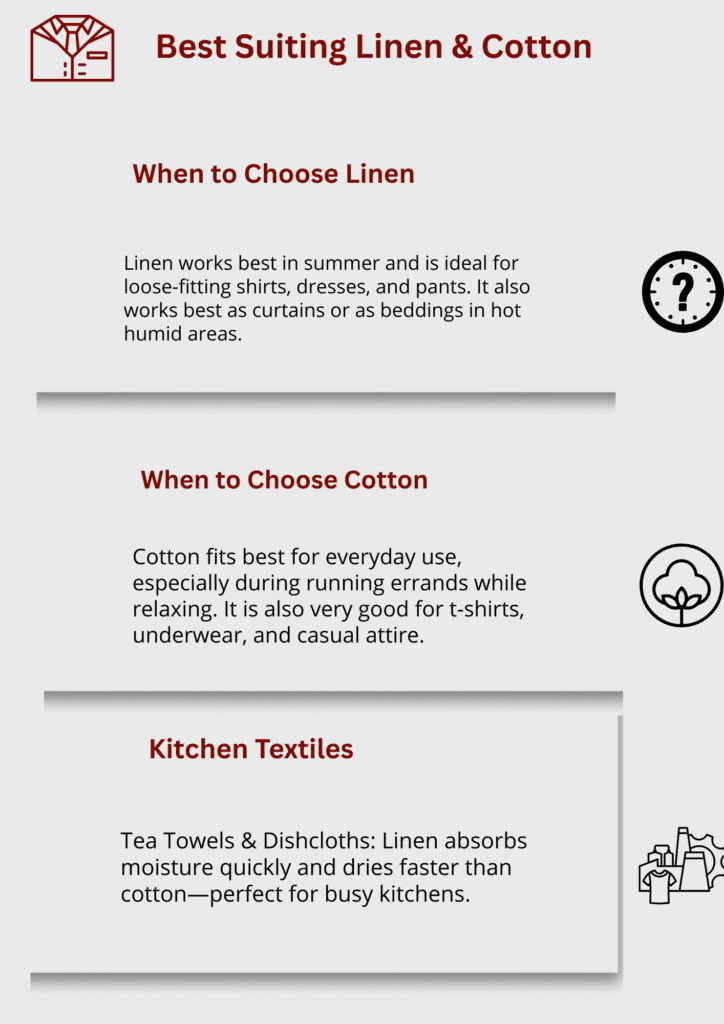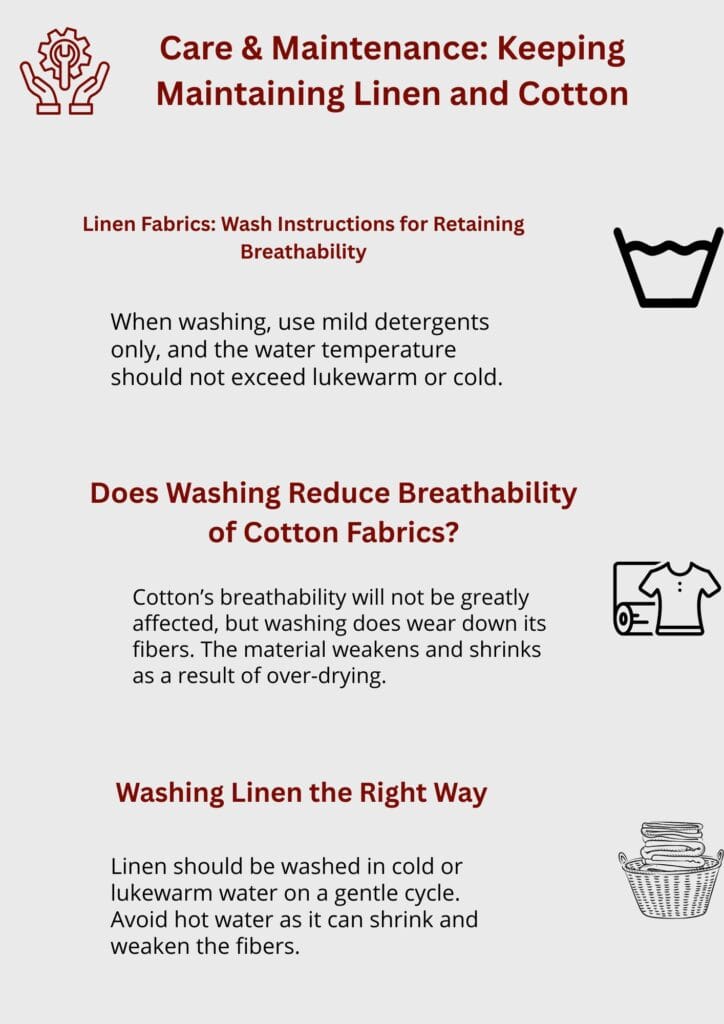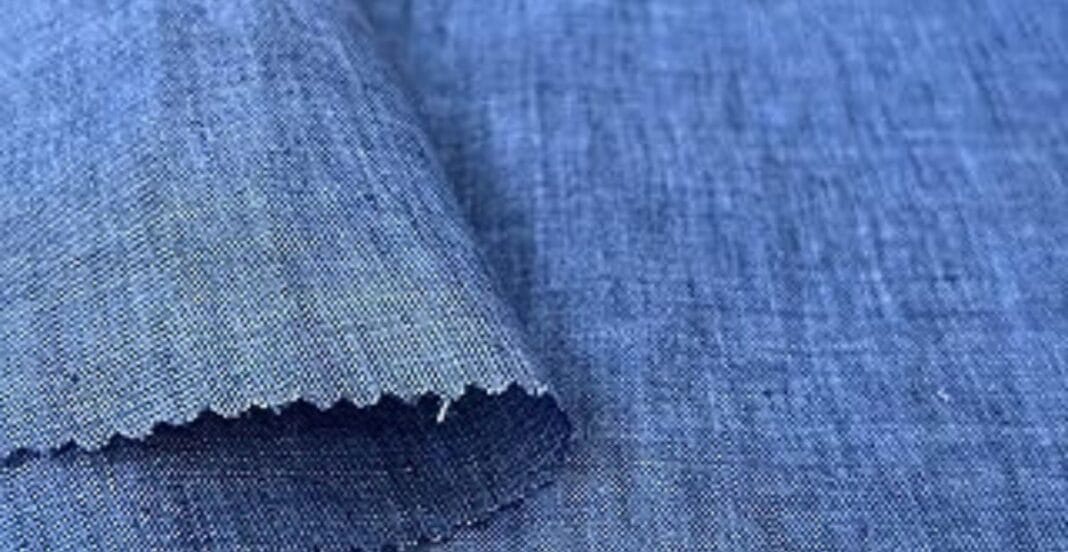Introduction
The topic of discussion for this article is whether or not linen is more comfortable than cotton during particularly warm temperatures. It is not uncommon for people to search for the softest and most comfortable attire amidst the sweltering heat; hence the comparison of these two timeless fabrics. Even though both fabrics are comfortable and made from natural fibers, breathable and absorbent, it is worth noting that linen has more prominence than cotton during the summer months:is linen cooler than cotton
Both cotton and linen are classified as natural fibers. Cotton is obtained from the fluffy fibers of the cotton plant. As for linen, it is obtained from the flax plant. Their composition influences their feel, strength, and durability in hot weather. Due to the ever-increasing global temperatures, the need for light and sweat-free clothing is at an all-time high. This is exactly the reason why we are undertaking this piece of work. It includes interviews from experts in textiles, as well as quotes from everyday users.
Now, let us find out if linen is indeed better than cotton when it comes to high temperatures, in order to make an informed decision for our summer comfort.
Important Characteristics of Linen and Cotton Fabrics
Breathability – Which Fabric Allows More Airflow?
Linen and cotton, both breathable fabrics, are preferred for the hot weather. Between the two, linen has better breathability and ventilation because its weave is more fibrous and porous. This structural feature of linen allows greater circulation of air between the skin and the fabric, and thus, retains much lower temperature than cotton. Because of this, people traveling to hot areas prefer linen dresses.
Cotton as a fabric, while breathable is not as ventillated as linen, therefore absorbs moisture heavily. In humid climates, cotton absorbs the moisture from the skin and tends to get damp and clingy. This feature of cotton can be bad for outdoor activities especially in hot and humid weather.
Caring For–Sweat Absorption Capability
This is referred to as sweat absorption. Linen fabric can absorb sweat and wicks moisture faster than cotton, which retains moisture even when dried. Linen still drapes better than cotton. For this same reasons some prefer linen pants.
Heat Conduction – Is Linen or Cotton Better For Keeping You Cool?
Linen conducts heat exceptionally well. It draws away body heat relatively fast, creating a natural cooling effect. This is one of the reasons why linen is crisp and refreshing even in extreme heat.
Cotton, on the other hand, insulates more. Although it is still appropriate during summer, it retains body heat for a longer period than linen does. This becomes more apparent during prolonged exposure to hot environments.
Scientific Comparison: Is Linen Really Cooler Than Cotton?
The Journal of Natural Fibers published a study in 2021 confirming that linen garments remain cooler than cotton ones even under direct sunlight. This is because the fabric’s surface refracts heat more effectively than it is applied and does not cling to the body.
Most experts would recommend that if your linen stays cool as your main requirement, do not search further: it should always be your first choice. Science confirms what most people have already felt: linen does keep you cooler.
Linen vs. Cotton Comparison
Pros of Linen
- Breathable and Cool: Helps keep the body cool during physical activity.
- Moisture Wicking: Absorbs and eliminates sweat much more quickly.
- Durable: Stronger than cotton, particularly when wet.
- Eco-Friendly: Requires fewer resources to grow.
Cons of Linen
- Easily Wrinkled: Either needs ironing or a relaxed attitude about creases.
- Stiff Initially: Becomes softer with washing over time.
- Higher Cost: Usually pricely than cotton.
Pros of Cotton
- Soft texture: Comfortable from first wear.
- Affordability: Easier on the wallet.
- Widely Available: Found in most clothing stores.
- Ease: Machine-washable and requires little attention.
Cons of Cotton
- Less Breathable: Keep air-holding and sweat retention during humid weather.
- Can Shrink: Especially if not pre-shrunk.
- Not as Cooling: Retains body heat more than linen.
Best Suiting Linen & Cotton

When to Choose Linen
Linen works best in summer and is ideal for loose-fitting shirts, dresses, and pants. It also works best as curtains or as beddings in hot humid areas. People traveling to tropical places usually like to wear it because it is light and airy.
If your daily routine requires you to sweat a lot, wear long harem pants or sleeveless dresses made of linen in hot weather regions.
When to Choose Cotton
Cotton fits best for everyday use, especially during running errands while relaxing. It is also very good for t-shirts, underwear, and casual attire. Those with sensitive skin do prefer cotton for its lack of irritation.
If you have a lot of clothes and tend to overheat easily, invest in cotton clothing as it is affordable, easy to find, and transition colders seasons.
Real Life Experience & User’s Opinion
I came across Reddit forums and fashion blogs where these users have a constant burning question: is linen cooler than cotton in real life? Those that did decide to switch to linen have testified that their comfort in hot areas has drastically shifted.
A Reddit user shared their experience, stating, “I used to wear cotton in the summer, but switching to linen shirts changed everything. I sweat less and feel drier.”
Travel bloggers and residents from hotter regions often recommend linen as a must-have for scorching temperatures. Despite the initial stiffness and higher cost, the majority of travelers agree that the heat-trapping benefits far exceed the negatives.
Linen vs. Cotton for Bedding & Sleep Comfort
Which Keeps You Cooler at Night?
Linen bedding is often recognized for its temperature-regulating capabilities over the course of the night. Because of its breathability, hot sleepers tend to stay cooler and drier. Flax linen sheets are ideal for hot and humid regions.
While cozy, cotton bedding tends to trap heat and moisture, especially if it is not a lightweight weave. For better airflow, choose lightweight cotton percale over sateen as it is cozier.
Best Options for Hot Sleepers
If night sweats or summer heat affects your ability to sleep, then linen sheets are a smart investment, as they help to keep your body cool and dry. Those who suffer from moderate heat may find cotton sheets more preferable, especially when set in a soft environment.
Sustainability and Environmental Considerations
Is Linen More Eco-Friendly than Cotton?
The cultivation process of linen is more environmentally friendly as it uses lesser water and pesticides when compared to traditional cotton. Flax, the plant used to produce linen, flourishes in poor soil with little irrigation. Hence, linen is a more sustainable fabric as compared to cotton on the whole.
The production of cotton, especially conventional cotton, is detrimental as it constitutes an intensive use of water. Nevertheless, there is a more sustainable option in the form of organic cotton. While it reduces the use of harmful agricultural inputs and impacts the environment, it still consumes more water than linen fabric.
Organic Cotton vs. Flax Linen
Sustainability wise flax linen takes the lead in comparison to organic cotton. Linen’s sustainability benefits include being biodegradable, requiring only limited processing, and producing less pollution. Organic cotton, while benefiting the environment, does not top linen in regards to sustainability.
Section Title Myths Busted
“Cotton Is Always Cooler Than Synthetic Fabrics—But Does It Beat Linen?”
While cotton fabric is cooler than most synthetics, it is beaten by linen. In fact, linen is the most breathable fabric and shines in high heat situations.
“Does Linen Become Softer With Age?”
Linen indeed becomes softer to the touch. Its initially crisp texture transforms to softer with every wash. The ‘worn in’ feel that pre-washed linen offers is something many appreciate over time. Moreover, linen is softer to begin with when pre-washed.
Care & Maintenance: Keeping Maintaining Linen and Cotton

Linen Fabrics: Wash Instructions for Retaining Breathability
When washing, use mild detergents only, and the water temperature should not exceed lukewarm or cold. Avoid using fabric softeners, as they leave a coating on the linen which reduces its breathability. Line drying saves energy and preserves the fabric’s texture.
If you would like to iron linen, do so when it is slightly damp to give it a smooth finish. If you prefer not to iron, embrace the natural wrinkles.
Does Washing Reduce Breathability of Cotton Fabrics?
Cotton’s breathability will not be greatly affected, but washing does wear down its fibers. The material weakens and shrinks as a result of over-drying.
For best results, tumble-dry cotton on low heat, while maintaining cool-water washing.
Price Comparison and Availability of Linen and Cotton: Is Linen Worth The Price Premium?
Shirts made out of linen are relatively more expensive than their cotton counterparts. A linen shirt takes a considerable amount of time to make as compared to a cotton one, hence why it is usually priced two to three times more than a basic cotton shirt. In the long run, it is worth every penny spent due to its enduring value and cooling properties.
You may find more affordable options at Uniqlo, H&M or Quince. For sheets or linen, Brooklinen and Parachute sell mid-range range flax linen pillows and sheets so that you do not have to break the bank. These brands offer value and quality to your comfort needs while skimping on the bank balance.
Linen may be pricud-priced for many users, however, the investment may pay off in the long run.
Conclusion
Linen is cooler than cotton because it breathes better, moisture-wicking, and heat regulation. The linen’s structure lends to greater breathability which is ideal during hot summer days or when the weather is humid. It is also more effective in pulling moisture away and drying, allowing it to keep you dry and comfortable.
However, cotton also has its positive attributes. For example, it is soft, affordable, and good for everyday use. For those who have sensitive skin, it works wonderfully. But, for those who wish to remain cool during hot weather, whether they are sleeping or engaging in activities outdoors, the winner certainly is linen.


